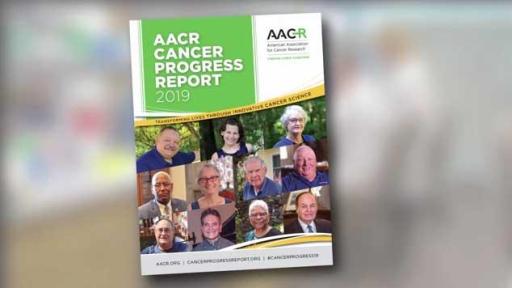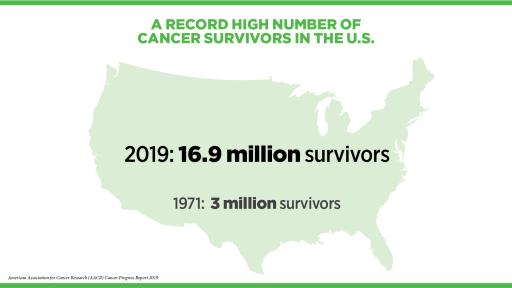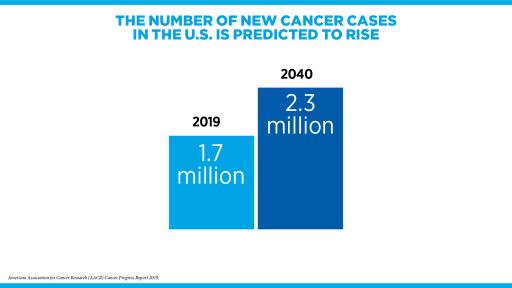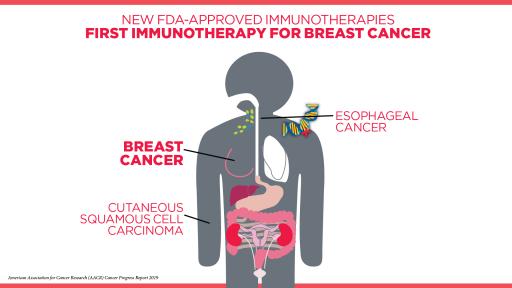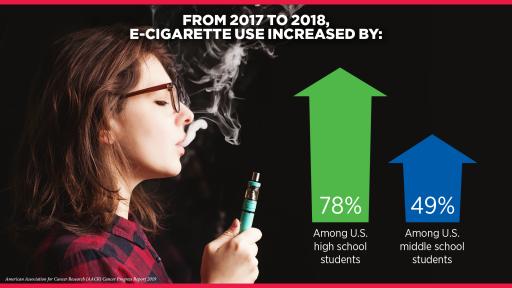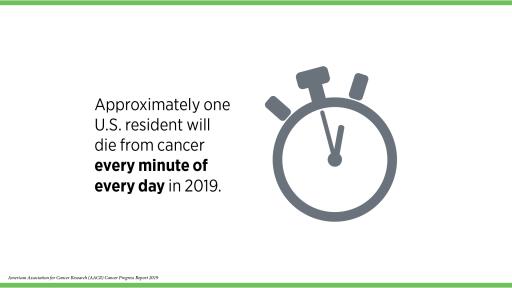Research Continues to Drive Advances Against Cancer
AACR Cancer Progress Report 2019 details 27 new cancer treatments, a record high number of U.S. cancer survivors, and the benefit of increasing federal investments in medical research through the National Institutes of Health and the National Cancer Institute
Editor’s Note: The video news release is available without lower thirds and as a split track. In addition, b-roll and photos of AACR President Elaine Mardis, PhD, and the cancer survivors are available. Please contact Rachel Salis-Silverman at [email protected] or 215-446-7159.
PHILADELPHIA — The American Association for Cancer Research (AACR) today released its annual Cancer Progress Report highlighting how research largely supported by federal investments in the National Institutes of Health (NIH) is spurring improvements in public health and innovative breakthroughs across the spectrum of cancer care.
The AACR Cancer Progress Report 2019 outlines advances made against cancer from August 1, 2018 to July 31, 2019, including the following:
- Twenty-seven treatments were approved by the U.S. Food and Drug Administration (FDA) to treat several cancer types for the first time. This is the highest number ever reported in the Cancer Progress Report. Among these treatments are:
- the first molecularly targeted therapeutic approved for treating cancers with a specific genetic biomarker regardless of the type of cancer; and
- the first immunotherapeutic for use in the treatment of breast cancer.
- The number of cancer survivors in the United States reached a record high of more than 16.9 million on January 1, 2019.
- The overall cancer death rate decreased more rapidly among African American men than white men from 1990 to 2016. In 1990, the overall cancer death rate for African American men was 47 percent higher than it was for white men. This disparity narrowed to 19 percent in 2016.
“Over the past few decades, a surge in scientific discovery and technological innovation has stimulated unparalleled progress against cancer,” said Elaine R. Mardis, PhD, President of the AACR and co-executive director of the Institute for Genomic Medicine at Nationwide Children's Hospital in Columbus, Ohio. “Robust annual increases in federal funding for medical research will pave the way for the next major breakthroughs that will transform cancer patient care.”
Cancer: An Ongoing Challenge and Costly Disease. Research: A Vital Investment
The report emphasizes that despite the extraordinary progress that we are making against cancer, the disease continues to pose enormous public health challenges.
According to the report:
- The number of new cancer cases in the United States is predicted to rise from more than 1.7 million in 2019 to more than 2.3 million in 2040, due largely to overall population growth and because the segment of the U.S. population that accounts for the majority of cancer diagnoses—those age 65 and older—is growing.
- The number of high-school and middle-school students using e-cigarettes, which deliver very high levels of nicotine and emit numerous potentially toxic substances, jumped 78 percent and 49 percent from 2017 to 2018, respectively. This trend is putting progress in curbing cigarette smoking in jeopardy because youth who use e-cigarettes are more likely to transition to conventional cigarettes. In addition, concern has been raised about the health hazards posed by e-cigarettes to the developing brain and the respiratory system in youth and young adults.
- Nearly 20 percent of U.S. cancer diagnoses are related to excess body weight, alcohol intake, poor diet, and physical inactivity. Obesity alone is currently responsible for about 8 percent of cancer cases among U.S. adults age 30 and older, and the prevalence of obesity is rising; it is up from 11 percent of men and 16 percent of women in the early 1960s to 38 percent of men and 41 percent of women in 2016.
The report explains that the increasing burden of cancer underscores the need for continued transformative cancer research to develop new approaches to prevention, early detection, and treatment. It also calls for our elected leaders to:
- Continue to support robust, sustained, and predictable growth in the NIH budget by providing an increase of at least $2.5 billion for the NIH in fiscal year (FY) 2020, for a total funding level of at least $41.6 billion.
- Ensure that the funding designated through the 21st Century Cures Act for targeted initiatives, including the National Cancer Moonshot, is fully appropriated in FY 2020 and is supplemental to the increase in the NIH base budget.
- Support the FDA’s critical regulatory science initiatives by providing an increase of at least $316 million in discretionary budget authority for medical products.
- Support the Centers for Disease Control and Prevention Cancer Prevention and Control Programs with total funding of at least $555 million. This includes funding for comprehensive cancer control, cancer registries, and screening and awareness programs for specific cancers.
“There has never been a more promising time in history for the cancer field,” said Margaret Foti, PhD, MD (hc), chief executive officer of the AACR. “The rapid pace and broad scope of the progress we are making against cancer are extraordinary and we are now poised to deliver the next wave of lifesaving breakthroughs. If we are to seize these opportunities to make unprecedented advances for patients, it is vital that we ensure that medical research remains a high priority for our nation’s policy makers.”
Follow us: Cancer Research Catalyst http://blog.aacr.org; Twitter @AACR; and Facebook http://www.facebook.com/aacr.org
For AACR information, visit Fast Facts.
About the AACR Cancer Progress Report
The annual AACR Cancer Progress Report is a cornerstone of the AACR’s efforts to increase public understanding of cancer and the importance of cancer research, while also advocating for increased funding for government agencies that fuel progress against cancer and improve public health, in particular the National Institutes of Health (NIH), National Cancer Institute (NCI), U.S. Food and Drug Administration (FDA), and Centers for Disease Control and Prevention (CDC).
About the American Association for Cancer Research
Founded in 1907, the American Association for Cancer Research (AACR) is the world’s first and largest professional organization dedicated to advancing cancer research and its mission to prevent and cure cancer. AACR membership includes more than 42,000 laboratory, translational, and clinical researchers; population scientists; other health care professionals; and patient advocates residing in 120 countries. The AACR marshals the full spectrum of expertise of the cancer community to accelerate progress in the prevention, biology, diagnosis, and treatment of cancer by annually convening more than 30 conferences and educational workshops, the largest of which is the AACR Annual Meeting with more than 22,500 attendees. In addition, the AACR publishes eight prestigious, peer-reviewed scientific journals and a magazine for cancer survivors, patients, and their caregivers. The AACR funds meritorious research directly as well as in cooperation with numerous cancer organizations. As the Scientific Partner of Stand Up To Cancer, the AACR provides expert peer review, grants administration, and scientific oversight of team science and individual investigator grants in cancer research that have the potential for near-term patient benefit. The AACR actively communicates with legislators and other policymakers about the value of cancer research and related biomedical science in saving lives from cancer. For more information about the AACR, visit www.AACR.org.
Media Contacts
Rachel Salis-Silverman
[email protected]
Office: 215-446-7159
Cell: 267-970-3685
Rick Buck
[email protected]
Office: 215-446-7162
Cell: 856-562-5668


